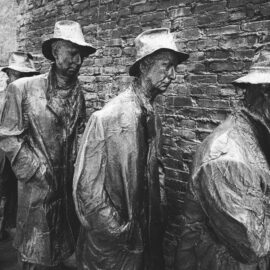

This article is an excerpt from the Shortform summary of "The Federalist Papers" by Alexander Hamilton. Shortform has the world's best summaries of books you should be reading.
Like this article? Sign up for a free trial here .
What is Federalist Paper 78 about? How does the power of judicial review provide an important check on other branches?
The power of judicial review is the ability of the courts to nullify unconstitutional laws. Federalist Paper 78 discusses the power of judicial review in the Constitution.
Read more about Federalist Paper 78 and the power of judicial review.
The Power of Judicial Review in the Constitution
The third branch of government, the judiciary, is unique. Unlike the executive branch, it possesses no army, navy, or other powers of enforcement to compel adherence to its decisions. Unlike the legislature, it has no direct power of the purse.
Despite these limitations to its practical power, the courts are powerful and important players on the constitutional system. They are the referees, policing the conduct of the other two branches with respect to the Constitution.
The Arguments of Federalist Paper 78
The way that the federal courts exercise this is through the power of judicial review. This is the power of the courts to declare null and void those laws or executive orders that are in violation of the Constitution. For example, the Constitution expressly prohibits Congress from passing any bills of attainder—that is, a bill declaring an individual guilty of some offense without recourse to a trial, and punishing them accordingly. If Congress were to pass and the president sign such a law, the judiciary would have a duty to declare it unconstitutional.
In general, the federal courts rule on matters pertaining to the Constitution, the laws of the United States, treaties, matters arising on the high seas, cases involving ambassadors or citizens of other countries, and disputes between the states or between citizens of different states. Federalist Paper 78 supports these federal judiciary powers.
The state courts could not be trusted to be impartial in cases to which the states themselves were parties. Such cases could only be fairly handled by the federal court system, whose judges would have no particular loyalty to any state. There would also be occasions in which federal courts would rule on matters pertaining to state laws themselves. Typically, these would involve cases where states had passed laws that they were prohibited from passing by the Constitution (such as laying customs duties on imports from other states, as we discussed in Chapter 3). In such cases, the federal courts would have the power and duty to declare such laws unconstitutional.
According to Federalist Paper 78, the power of judicial review in the Constitution would serve as a powerful check on both the executive and legislative branches. While courts generally do not have many formal powers to enforce their rulings, Congress and the president have historically complied with court orders, even when they disagreed with them.
(Shortform note: Compliance with court rulings is an important norm, or unwritten law, of democratic governance. When players in the system begin disregarding rulings that they dislike, it threatens to undermine the entire system. For a fuller discussion of the importance of governing norms in healthy democracies, read our summary of How Democracies Die.)
The Supreme Court
The highest court in the land was to be the United States Supreme Court. While Congress was authorized to create and abolish inferior federal courts (like regional district courts and appellate courts), the Supreme Court was created by the Constitution itself to be the final arbiter of legal controversies.
In the main, the Supreme Court acted as an appellate court—issuing final rulings (for those cases it chose to hear) on cases that had worked their way through the inferior federal courts. The only cases where the Supreme Court would have original jurisdiction would be cases involving ambassadors or cases in which a state was a party to a suit.
Federalist Paper 78 rejected the argument that there should be no supreme judicial tribunal and that the final arbiter should be the Senate (similar to the role performed by the House of Lords in Great Britain). This would have been a clear violation of the principle of separation of powers. It was incompatible with free government to have the same body that had a decisive role in creating laws to have the final say in interpreting those laws, according to Federalist Paper 78.
Moreover, people would not necessarily be elected to legislative bodies for their independence or strict adherence to constitutional principles; rather, they would often be regional or party favorites. As elected politicians (who would be up for reelection), they would therefore be more likely to base their judicial decisions on improper political considerations.

———End of Preview———
Like what you just read? Read the rest of the world's best summary of Alexander Hamilton's "The Federalist Papers" at Shortform .
Here's what you'll find in our full The Federalist Papers summary :
- The genius of the founding fathers in how they designed the United States Constitution
- Why it was critical for the United States to form a union rather than stay separated as colonies
- How Alexander Hamilton anticipated social issues that are still relevant today






